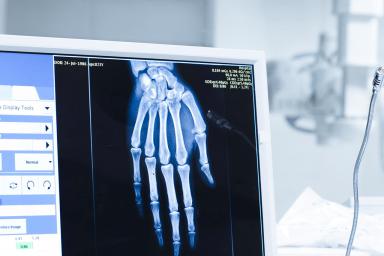Professional & Technical / Allied Health Professions

There are all sorts of roles available within the allied health professionals.
You could help treat a broken toe or assess and make recommendation for someone’s diet. The allied health professions (AHPs) include everything from podiatrist, dietitian and music therapist to physiotherapist, diagnostic radiographer, therapeutic radiographer and speech and language therapist.
Whichever you choose, you’ll make a big difference to patient care. Whether you’re interested in science, the arts or physical movement, you’re bound to find a role to suit you.
Entry requirements
Entry requirements to be an AHP vary, and acquiring the knowledge and skills to become a profession involves training and study at degree or diploma level.
The academic requirements and training demands are high, but so are the rewards, in terms of both job satisfaction and career prospects.
Autonomy and teamwork
AHPs carry their own caseloads and work as autonomous professionals, for example working directly with patients to develop interactive therapies to aid recovery.
But AHPs will also be part of a team and may even lead one. This might mean working with other AHPs or professionals such as GPs, hospitals doctors, teachers or social workers.
AHPs see patients and clients in different surroundings and they work in hospitals, clinics, housing services, people’s homes, schools and colleges, to name but few.
Support roles
The health system also needs a range of vital support staff. These roles do not require any set academic qualification.
Life sciences
Life science staff play a major role in the delivery of healthcare.
Whether they are helping couples with IVF or supporting doctors and other healthcare professionals in the diagnosis and treatment of disease, they are a crucial part of the team.
Roles in the life sciences can be divided into three areas:
- Pathology – investigating the causes of illness and how it progresses; carrying out tests on tissue, blood and other samples from patients. Pathology plays a crucial role in helping doctors choose the best type of treatment for patients and monitoring its effectiveness.
- Genetics – understanding the genetic components of illnesses.
- Reproductive science – a rapidly developing field, creating life and providing other solutions to infertility. Healthcare science teams in life sciences work in:
- Hospital laboratories – including clinical pathology laboratories and laboratories in specialist hospitals.
- The community – including clinics.
- Organisations such as NI Blood Transfusion
Pharmacy
Medicines are the most common form of treatment in the NHS and some pharmacies are where medicines are stored, prepared and dispensed. Pharmacies also offer health advice to patients on issues such as giving up smoking and sexual health.
Some pharmacists are in hospitals, others are in the community, including those based in supermarkets and high street shops. Some members of the pharmacy team work for other employers that provide NHS services.
Pharmacy staff work at different levels:
- Pharmacist
- Pharmacy technician
- Pharmacy assistant
You could become a pharmacy assistant with GCSEs in English and Maths. To train as a pharmacy technician you need at least four GCSEs including science. Pharmacist have a Masters qualification followed by a year working under supervision. Wherever you start, you will be encouraged to take qualifications and progress in your career. Assistants can apply to train as technicians and technicians can go on to train as pharmacists.
At any level in pharmacy, you need good customer service and communication skills and you have to be able to follow instructions and procedures carefully.
Pharmacists
Pharmacists are registered healthcare professionals who are experts in medicines and their uses. They advise clinical staff on choosing and using medicines for patients, including which form of medicine to use such as tablet, injection, ointment or inhaler. Pharmacists make sure medicines are stored and used safely and that patients are aware of possible side effects.
Pharmacy Technician
Pharmacy technicians work under the direction of a registered pharmacist, dispensing prescriptions, ordering new stock and receiving deliveries. In a hospital, technicians may take medicines to wards and departments. They may make specialist medicines under sterile conditions. In a high street pharmacy, technician may be known as dispensing assistants who deal directly with customer’s queries and questions about their medicines. Pharmacy technicians have to be qualified and registered.
Pharmacy Assistant
Pharmacy assistants work under the direction of a registered pharmacist in a hospital or high street pharmacy. They take in and hand out prescriptions, sell over-the-counter medicines and pack and label medicines. Assistants use IT systems to order supplies, generate stock lists and print labels. They answer customer’s questions and refer problems or queries to the pharmacist.

